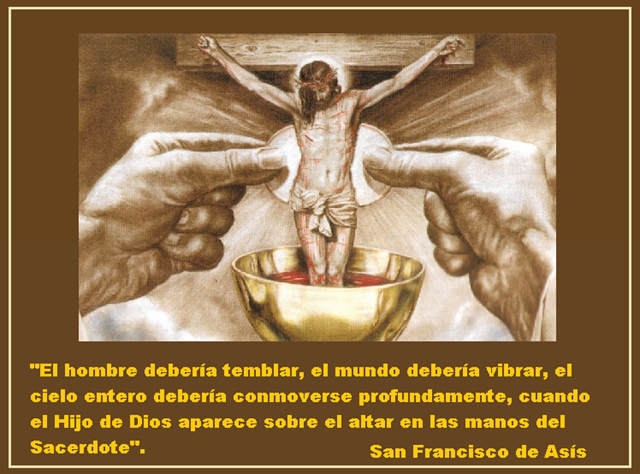Maundy Thursday
On Palm Sunday, we reflected upon the reason for uniting the joyful procession of the palms with the mournful reading of the passion, and we found that it is only through suffering that we can attain glory.
Today, Maundy Thursday, the eyes of our minds and hearts turn to the upper room, the Cenacle, where Our Blessed Lord concludes the Old Covenant by celebrating the last legitimate passover and institutes the New Covenant in His Body and Blood after having washed the feet of the disciples.
Here too we find that mysterious uniting of what seems so different, so diametrically opposed. The Lord gives us the living presence of His most precious Body and Blood, now glorified in Heaven, to be the life of our souls, for “he who eats this bread shall live forever” (John 6), but He does so under the appearances of want and need, poverty, sacrifice and death. This sacrament which He bequeathes to us tonight then, continually draws us into the mystery of His self-offering, that is to say, His passion and death. It does so by uniting us with the divinity in the very act of self-immolation.
What can this possibly mean, my dear friends, if not that we too are called to enter this awesome mystery of the sacrifice of God, first of all by honouring the Presence and the Sacrifice that makes it possible, but also by offering ourselves with Him? Jesus Our Saviour gives Himself to us under the appearances of death and suffering. He brings to us in the Holy Mass and Holy Communion all the power of His death, and He therefore makes it possible for us to so become one with Him that we can each say in truth: this is my body broken, this is my blood poured out.
Each of us can offer ourselves with and through Christ who is the perfect offering to God. In such a way, when our energies are challenged by burdens laid on our shoulders, when things do not go as planned, when someone does not follow through with their word to help us, and another falsely condemns us; when our body aches and our heart is tormented, and especially when we can see no distant light for the depth of the darkness we seem locked into, then we need to remind ourselves that we are nourished with the sacrificial death of the Son of God.
Such is ultimately the reason for which Christ wanted the Eucharist to be much, much more than a symbol of His love for us, a simple memorial of what He did for us. That was not enough for the Heart of Christ. He wanted more. And the more He wanted was to make it possible for every generation of the faithful, for each and every Christian, to be offered up, to be subsumed in His eternal sacrifice, and thus become an eternal offering to the glory of the Father. This is why St Thomas tells us that the Holy Eucharist contains totum Christum passum – Christ whole and entire with all that He suffered. Such is the Christ we receive in Holy Communion. Such is the Christ reposing in the tabernacle.
When we come to understand these things, then we no longer need anyone to explain to us why the Church puts so much effort into the celebration of the sacred mysteries, why she so lavishly adorns her priests and her altars, why this very evening, as we accompany the sacred body of Our Lord to the altar of repose, we do so with such love and tender devotion in our hearts, and will make efforts to keep Him company this night.
On this altar is made present once again the central event of human history, which is the sacrifice of the God-Man. On this altar each of us is invited to place ourselves, or rather, to allow ourselves to be placed by Christ Himself. In that way, along with the totum Christum passum, there will also be tota Ecclesia patiens, the Church, full and entire, with all her sufferings and trials. Si compatimur, conglorificemur – if we suffer with Him we will be glorified with Him.



